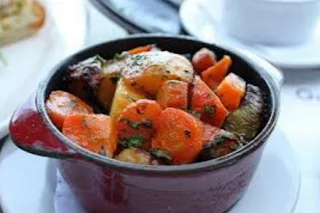The African Gourmet meatless Egusi Soup recipe is a high in calories melon seed soup which provides a balanced mix of macronutrients and micronutrients, making it an excellent choice for those looking to gain weight healthily.
 |
| High-Calorie Egusi Soup Recipe |
Healthfully High in Calories: Egusi Soup Recipe
Many struggle with gaining weight, and finding nutrient-dense, calorie-rich meals can be challenging. The African Gourmet Egusi Soup offers an ideal solution. This high-calorie melon seed soup is an excellent choice for healthy weight gain.
Egusi melon seeds are the star of this dish, known for their richness in healthy fats, protein, and essential vitamins. Palm oil, another key ingredient, adds a dense source of calories and healthy fats, further boosting the nutritional profile of the soup.
Wild watermelon is the source of egusi seeds, which are fatty and protein-rich seeds from the cucurbitaceous plant. These seeds are used to prepare egusi soup, which is a type of soup thickened with ground egusi seeds cooked with water and oil.
Egusi melons look just like watermelons on the outside but are very different. Their flesh is bitingly tough and is used mainly for their seeds. Egusi melon seeds can be pressed into patties and used as a meat substitute, and their oil, like palm oil, can be used for cooking.
Egusi Soup High Calorie Meatless Soup Recipe
Healthfully high in calories, egusi seeds are used to season and thicken African soups and stews, and combined sparingly with palm oil, our meatless West African stew rates five stars on the favorite African recipe list.
Prep time: 20 minutes Cook time: 30 minutes Total time: 50 minutes
Ingredients:
½ cup ground egusi seeds
2 handfuls of spinach
2 carrots, diced
2 handfuls of chopped bitterleaf
3 handfuls of chopped ugu pumpkin leaves
2 large tomatoes, chopped
2 medium white potatoes, diced
1 large onion, chopped
2 cloves garlic, chopped
1 tablespoon palm oil or olive oil (palm oil is about 49% saturated fat, olive oil is less than half of that)
1 teaspoon curry powder
1 hot pepper, chopped
5 cups vegetable stock or water
Directions:
Heat palm oil over medium heat in a large pot. Add onions and garlic. Add remaining ingredients except egusi, spinach, bitterleaf, and ugu. Cover and cook for 20 minutes, stirring occasionally. Add egusi and simmer 10 minutes longer. Finally, add spinach, bitterleaf, and ugu and simmer for 2-3 minutes. Serve hot with fufu, pounded yam, rice, or any preferred side dish.
Did you know? African palm oil, aka macaw fat, is the world’s most popular and most purchased vegetable oil, making up about 35 percent of the international trade in cooking oils. The Palm oil tree has many uses, and no part of the tree goes to waste.
Vermilion-colored palm oil has a mild, neutral taste and smell with a subtle hint of earthiness. It doesn't have a dominant flavor, allowing the natural flavors of its ingredients to shine through. When used in cooking, it adds a smooth richness to dishes without overpowering other flavors.
The African Gourmet Meatless Egusi Soup recipe is high in calories, nutrient-dense, and a healthy fat melon seed soup to help with weight gain.
- Curried Tanzanian Coconut Okra Recipe
- Ethiopian Scrambled Egg Breakfast
- Senegalese Chicken Vermicelli
- Chadian Steamed Honey Cassava Buns
- Nigerian Breakfast Fried Akara and Ogi



























